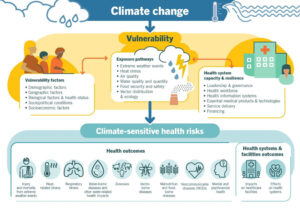Africa Climate Summit 2023: The inextricable link between public health and climate change

The inaugural Africa Climate Summit has drawn its curtains in Nairobi, Kenya. Being the first climate summit bringing African leaders to steer the climate change conversation from an African lens, it remains a strong indicator that Africa is positioning itself for a greater and unified voice in the international spectrum. More importantly, the fact that Africa contributes to only about 3% of the global climate change problem, but continues to suffer greatly from it, this Summit was a step in the right direction to making Africa’s voice clearly heard within the global climate change agenda.
To guide the African position at COP28, the Summit solidified its position on issues of concern around climate change conversations to the global community. The declaration, now famed as The Nairobi Declaration, 2023, seeks to highlight the continent’s potential as a green powerhouse and encourage other world leaders to support new global carbon taxes. An excerpt of the final document reads:
“This declaration will serve as a basis for Africa’s common position in the global climate change process,”…. No country should ever have to choose between development aspirations and climate action.”
The unanimously adopted declaration, also calls for the processing of Africa’s vast resources more so minerals in the continent, noting that “decarbonizing the global economy is also an opportunity to contribute to equality and shared prosperity.”
It goes without saying that indeed the declaration makes a fundamental case for the conversation about climate change for the continent. That notwithstanding, and painstakingly, the Declaration does not prioritise public health as a pillar of the conversation on climate change. As a foundation-setting document, it would have been greatly welcomed if the document centralised public health in the conversations, considering the dire situation of Africa’s public health terrain, which has heavily been influenced by climate change.
Despite our earnest efforts to highlight the disproportionate burden and risks many African countries endure due to climate change-induced unpredictable weather events and patterns, including prolonged droughts, devastating floods, wildfires, and their impact on human life, economies, education, peace security and notably public health, the Summit missed an opportunity to prioritise public health as a critical component within the climate change conversation.
Public health and climate change are inextricably linked and as such any conversation around climate change, and its financing, without public health in the picture is incomplete. Climate change poses a great threat to the well-being of Africans. From extreme heat levels to the risk of respiratory infections such as asthma and changing the modes of disease spreading, the challenge is growing bigger by the day. Some of these are already happening in various African countries, hence the need to prioritise them now more than ever, more so with the looming COP28.
As evinced in Figure 1 below, climate change can exacerbate existing health threats or create new public health challenges through a variety of pathways.

The World Health Organization has continuously reiterated that the climate crisis threatens to undo the last 50 years of progress in development, global health, and poverty reduction, and to further widen existing health inequalities between and within populations. It greatly jeopardises the realisation of the goals of universal health coverage (UHC) in numerous ways, to wit: compounding the existing burden of disease and exacerbating existing barriers to accessing health services, often at the times when they are most needed.
Further to it, more than 930 million people, about 12% of the global population, spend at least 10% of their household budget to pay for health care. With the poorest people largely uninsured, health shocks and stresses already currently push around 100 million people into poverty every year, with the impacts of climate change worsening this trend. This reiterates why health must form part and parcel of the climate change talk, and the Africa Summit, 2023 fell short in that regard.
In conclusion, the Summit presented an opportunity for the African leadership to take a holistic approach to the climate change conundrum, and it seems like they failed to do so. It is the hope of public health advocates that this was merely an oversight and not a daunting omission. The conviction still lies that influential voices within the African continent will elevate the discourse and lay the groundwork for the prioritisation of health in climate action. Such efforts would be indicators of strategic and smart moves to shape climate change conversations towards a holistic approach.

